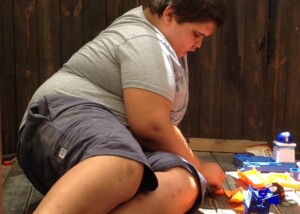Day programs for special needs adults are everywhere; here’s how to tell the excellent ones from the shoddy ones.
- Not all day programs are alike.
- They do not all operate in the same way.
I’ve been a direct support professional (aka direct care provider, supportive community connector) long enough to know how to spot a day program that doesn’t have your grown child’s best interests at heart.
The following are signs to look out for when seeking a day program for your adult child – whether they’re autistic, have an intellectual disability, Down syndrome, permanent effects from a TBI, or any other form of cognitive difference.
Individuals Have Minimal to No Say in Choosing Their Activities
I once worked for a nonprofit organization that randomly assigned four or five individuals to a single DSP every day.
Now certainly, when four or five adults are together in a group, it will be impossible to spend the next several hours doing activities that all four or five actually want to do.
However, this particular agency put a twist on this – and not to the group’s benefit, either.
The DSPs would arrive and look for their name on a computer generated screen to see “who they had” that day.
But in addition was a designated location that the DSP was required to take the group; usually, the location involved a specific activity.
For example, the designated location or activity could be bowling; volunteering with food distribution at a senior apartment complex; photography; putting designs on bags to be used to put food in for the needy; visiting an adoption center for dogs to walk them; and volunteering with a nonprofit senior services organization assembling food bags.
At first glance, all of that sounds fantastic, doesn’t it?
The content on the website for a nonprofit organization that services special needs adults might be crafted in a way to make the agency seem like a godsend to an adult with a cognitive difference.
This particular agency’s website was like that. It boasted a huge number of totaled hours over a time period that their individuals spent in the community performing volunteer work that readied them for future employment.
Take such marvelous sounding claims with a grain of salt.
The individuals were randomly put in the groups, without any consideration for whether or not they’d be interested in the activity that was designated for the group on that day.
The following are actual examples when I worked there:
• Photography. Nobody in my group ever wanted to try to use the bulky camera — provided by the agency — the kind of camera that professional photographers use.
You can’t force a disinterested person into photography. You can’t make them excited over taking pictures if that’s not their passion.
The three men I was with on one of the photography days had no interest in taking pictures.
All had phones and, I’m sure, took pictures whenever they felt like it in their daily life.
Anyone who IS interested in taking photos already does so with their phone!
• Doggie adoption center; assignment: walk a dog or two. One of the individuals in my group had considerable difficulty walking due to a birth defect, had poor stamina and poor balance.
How did he end up in the group for dog walking? Who assigned him to this group?
He began tiring almost immediately while holding the leash, which he did only because I encouraged it (which I did only because my boss expected me to; I could tell the young man wasn’t interested in any walking for that matter).
Soon after he struggled to walk with the rest of us even without holding a leash.
The other three weren’t very interested either. Hey, not everyone cares to walk a dog.
• Assembling food bags for the elderly. One individual did this quickly; turns out she already had a part-time job at McDonald’s.
Why was she put in this group, when she already had food assembly skills?
She was probably internally fuming that she was expected to perform a food service related task without pay.
The second person had a very compliant nature and would do whatever he was told to do.
The third and fourth individuals wanted no part in this operation. One, who was older and in poor health, alternated between napping and swaying to music, while the other watched him with amusement or created small talk.
But neither touched the food. I can’t blame them.
This day program was supposed to provide opportunities for low support needs adults to prepare for the workforce – as per their website.
The DSP can’t force adults to do something against their will.
Further, the older gentleman was in his 60s and napped excessively; he was no workforce candidate; why was he in this group for that day?
• Putting designs on bags. Two of my individuals did this without much prompting; they inherently enjoyed using crayons and markers to draw and color on the bags.
The two others wanted no part in this – no matter how much I kept encouraging them.
And why should they have? Not everyone wants to sit around drawing things on paper bags. Do YOU?
We were expected to cajole these adults into doing things they had no interest in.
I felt like a fraud, because I was treating those two like children, repeatedly attempting to get them to pick up a marker or crayon.
However, I was doing only what my supervisor expected me to do! I didn’t want to get fired (another employee was present with her group).
Special needs adults are NOT children in adult bodies.
Special needs adults are NOT children in adult bodies.
They are ADULTS in adult bodies and should be treated as such and not infantilized by trying to sweet-talk or wheedle them into performing juvenile (or even grownup) activities.
They should not have been expected to conduct tasks that they weren’t interest in – not any more than you or I should be nagged to partake in tasks that we have no enthusiasm for.
How would the top supervisors of this organization take it if they were at some party and someone there kept freaking nagging them to participate in a game of charades or some other activity when they had zero interest?
I’m pretty sure this wouldn’t go over well with them. Yet they expect special needs adults to be interested in doing anything and everything that’s thrown their way.
This is a form of ableism, of believing that disabled people have inferior status that gives their providers the right to dictate how they should spend their time.
These individuals were not getting paid to color on the bags. Individuals who don’t care for creating art should NOT be in a group that’s assigned artwork.
Just like the decision makers at this and similar organizations would never join a book reading club or wine tasting event if they were not interested in these activities. Yes, “just like.”
- To totally disregard a disabled adult’s interests, or lack thereof, is to disrespect them and treat them as “less than.”
Shame on that agency – even if there was usually time left over for the DSP to take the group where they actually wanted to go (e.g., a park, the library).
As mentioned, it’s unlikely that four, let alone five, people will all agree on every activity that a DSP proposes.
But if the DSP helps facilitate ideas with input from the group, this approach will optimize the outing.
Individuals Have No Say in Whom Their DSP Is for the Day
This is a form of disrespect and treating adults with a cognitive disability as though they’re children in adult bodies.
At the aforementioned agency, which serviced about a hundred adults (only around 75-90 would ever show up on a given day) with various cognitive disabilities or autism, the individuals were never allowed to choose the DSP for their day.
Instead, the decision makers expected these adults to magically connect with any and all providers whom they were assigned to (there was an ongoing turnover of DSPs).
Again, this is ableist thinking — assuming that a cognitive impairment prevents an individual from being particular about whom they want to be with, and that only “normal” people have this ability.
Now, I certainly realize that preventing a mismatching 100% of the time is plain logistically impossible.
We can’t expect to figure out, like some master computer that hasn’t yet been invented, how to swiftly create foursomes and fivesomes that are well-matched to the DSPs.
HOWEVER – what is feasible is what I term “optimization” of the matching.
If an agency doesn’t bother to implement optimization, and instead relies on a completely random assembling of groups and assigning them equally randomly to DSPs, then that’s a red flag.
There should be some degree – even if it’s just a little bit – of pre-planning and deliberation when it comes to matching groups with DSPs.
The nonprofit that I currently work for actually does this – and it’s a lot more than “some degree.”
Consistently good matching CAN be done; it’s not rocket science.
Day Program Is Essentially a Babysitting Program
For adults with high support needs or a severe level of cognitive impairment, a good day program will provide them with things to do and socializing if they wish.
Day programs allow their parents to work during the day, or allow other carers or host home providers a break.
But what about low support needs individuals, particularly those who want a job?
How much closer will they get to their goals if their days are spent pretty much at an arcade, a bowling center, an electronics store, the mall, the food court for two hours while the DSPs either spend that time on their phones or socializing only among each other?
Be leery of a day program that has mildly disabled individuals who have realistic goals in the same group as severely impacted individuals.
I was once assigned the Humane Society to interact with the cats and dogs.
Well, this hardly happened because one of the individuals had very high support needs – much of the day was spent tending to her (she had significant needs), depriving the others from time cuddling the kitties (we all had to stick together). We never even had a chance to even look at the dogs.
Agencies should make a concerted effort to keep support-need levels pretty consistent across the group.
But then that invites the challenge of managing four people who all have very high support needs. This would be quite stressful to a DSP.
It’s a two-edged sword. When higher functioning individuals are in the same group as a very needy person, this affects their experience and can leave them feeling cheated and frustrated.
Nevertheless, the organization should DO THEIR BEST to optimize. That’s the key: optimize, rather than just be so unthinking and random with group assembly.
Your son or daughter, who has the cabability to be employed one day or be much more independent in adulting, will be robbed of these opportunities if they’re in a day program that’s basically a babysitting operation.
Program Won’t Help Individual Achieve a Specific Goal
At the agency was a young woman whose profile said that she “wants to ride an animal.”
The people in charge never made any effort to make her goal a reality, even though it would’ve been easy to do so: Not too far from the agency building was an equestrian therapy program.
Another individual wanted a part-time job working in a videogame or electronics store.
I wanted to spend time helping him with job applications and bringing him to retailers to see if they’d give him a chance.
But how could I have done this if assignments never related to job seeking skills such as filling out applications, rehearsing answers to interview questions, body language, etc.?
Program Won’t Teach Basic Skills
I fully understand that one’s IQ could be too low to grasp counting change.
But there were individuals who clearly had the cognitive bandwidth to learn basic skills such as this, but the agency had no interest in teaching them.
It was more important to teach them how to use a camera that only professional photographers use, or cajole them into coloring on paper bags or putting oranges and apples into a plastic bag.
The Bottom Line
It isn’t easy for parents to fully vet an organization. But it’s pretty easy for them to be convinced, via the organization’s well-written website, that their agency will be a godsend to their child.
- What do you want for your child? What do THEY want? Does that match up with how the agency does things?
- Does your child want a part-time job in food services and seems capable with proper training? Then make sure the day program will give them this training instead of putting them in a babysitting group.
I’m not saying that every day program for every individual should be hardcore instruction in daily living skills.
They do need to socialize and just kick back. They do need breaks and leisure time. WE ALL DO.
But parents should do the best they possibly can at vetting various day programs.
Just because a given organization doesn’t have any reports of abuse or neglect, doesn’t mean it will provide your loved-one with the opportunity to grow and thrive. Remember that.
 Lorra Garrick has been covering medical and fitness topics for many years, having written thousands of articles for print magazines and websites, including as a ghostwriter. She’s also a former ACE-certified personal trainer. In 2022 she received a diagnosis of Level 1 Autism Spectrum Disorder.
Lorra Garrick has been covering medical and fitness topics for many years, having written thousands of articles for print magazines and websites, including as a ghostwriter. She’s also a former ACE-certified personal trainer. In 2022 she received a diagnosis of Level 1 Autism Spectrum Disorder.
.










































